Melatonin for Restoring Healthy Sleep in Dissociation
Introduction
When your mind and body don’t move in sync — when you feel detached, numb, or half-awake — sleep can become one of the most elusive things in the world. For people who experience dissociation, especially those recovering from trauma or chronic stress, nights can feel endless. The body lies still, but the mind races; or the mind shuts down, and the body feels foreign and restless.
At the heart of this problem lies a disrupted circadian rhythm — the internal clock that governs sleep, hormones, and even emotional stability. And one of the key molecules that sets that rhythm is melatonin, the “darkness hormone.”
Melatonin doesn’t just make you sleepy. It’s a powerful regulator of the nervous system, an antioxidant for the brain, and a bridge between body and mind. For people living with dissociation, restoring melatonin balance can help repair the physiological foundation for rest, reconnection, and emotional resilience. 🌿
Let’s explore how dissociation disrupts sleep chemistry, what melatonin really does in the brain, and how natural supplementation — used wisely — can help rebuild healthy sleep patterns without dependency.
Looking for supplements for This? Click here.
Dissociation and Sleep: The Body’s Disconnected Dialogue 🌌

Dissociation is the body’s ultimate defense mechanism. When stress or trauma overwhelms your capacity to cope, your brain activates survival circuits that blunt awareness. The amygdala fires danger signals, the hypothalamus floods your bloodstream with cortisol and adrenaline, and your parasympathetic nervous system eventually triggers a shutdown to conserve energy.
This cascade often leaves you feeling detached from emotions, surroundings, or even your physical body — a sense of watching your life from a distance.
At night, this disconnection shows up in a different form. The body may be exhausted, but the nervous system remains stuck in survival mode. You might feel both tired and wired, unable to fall asleep even when your eyes are heavy. Or you may crash into deep sleep but wake up unrefreshed, as if your brain never really “logged off.”
What’s happening underneath is HPA axis dysregulation — your hypothalamic-pituitary-adrenal system no longer syncing with the natural day-night rhythm. Cortisol stays high when it should drop, while melatonin — its opposite partner — stays low when it should rise.
This inverted rhythm keeps your stress hormones active after dark, preventing the deep, restorative sleep that helps integrate memory and emotion.
The Circadian Connection: Why Melatonin Matters 🌙
Every cell in your body follows a 24-hour rhythm governed by light and darkness. Melatonin, produced in the pineal gland, is the messenger that tells your brain, “It’s time to rest.”
As evening falls and light fades, the brain’s suprachiasmatic nucleus (SCN) signals the pineal gland to release melatonin into the bloodstream. Levels rise within an hour or two, promoting drowsiness and lowering body temperature. By morning, light exposure suppresses melatonin, allowing wakefulness to return.
When this rhythm works properly, you feel sleepy at night and alert during the day. But chronic stress, trauma, irregular sleep schedules, and screen exposure can disrupt melatonin production.
For those experiencing dissociation, the problem is compounded. The brain’s stress center (the amygdala) often overrides the sleep center (the SCN), flooding the system with cortisol even after dark. The result? Melatonin release is delayed or suppressed entirely, keeping the body alert when it should be resting.
Without adequate melatonin, the nervous system loses one of its most powerful signals of safety — the cue that says, It’s okay to let go.
The Neurobiology of Dissociation and Sleep Fragmentation 🧩
To understand melatonin’s role in healing dissociative sleep patterns, it helps to look at how trauma reshapes brain networks.
The amygdala, responsible for detecting threat, becomes overactive. The prefrontal cortex, which provides rational perspective, becomes underactive. The hippocampus, which organizes memories and situational context, shrinks due to stress hormone overload.
At night, these imbalances cause fragmented sleep. You might fall asleep briefly, only to wake multiple times — or drift in and out of shallow stages without entering restorative REM cycles.
Melatonin influences all of these regions. It calms the amygdala, enhances prefrontal activity, and protects the hippocampus from cortisol-induced damage. By re-establishing circadian order, melatonin helps the brain’s emotional and cognitive regions synchronize again — an essential step in reducing dissociation’s “mental fog.”
More Than a Sleep Hormone: Melatonin as a Nervous System Regulator 🌿
While most people think of melatonin as a natural sleeping pill, its effects go far deeper.
Melatonin is a neuroprotective antioxidant that neutralizes free radicals and reduces inflammation in the brain. It helps stabilize mitochondrial function — the energy engines of your cells — and lowers oxidative stress, which is elevated in chronic trauma and dissociation.
It also plays a key role in balancing the autonomic nervous system. Studies show melatonin enhances parasympathetic (rest-and-digest) activity while calming the sympathetic (fight-or-flight) response. In other words, it helps switch off the “threat alarm” that keeps many people trapped in dissociative insomnia.
When the parasympathetic system becomes dominant again, heart rate slows, breathing deepens, and the brain receives signals of safety. Only then can the body truly surrender into rest.
The Relationship Between Cortisol and Melatonin ⚖️
Cortisol and melatonin are hormonal opposites — one signals “wake and protect,” the other signals “rest and repair.” In healthy circadian rhythm, cortisol peaks in the morning to energize you and declines throughout the day, while melatonin does the reverse, peaking at night.
But in trauma survivors or those experiencing dissociation, cortisol often stays elevated at night and drops too low in the morning. This misalignment creates fatigue, brain fog, and insomnia — a cycle that reinforces emotional disconnection.
By supplementing with melatonin, you help re-train this rhythm. Over time, consistent nighttime melatonin can reset cortisol patterns, teaching the body when to rest and when to wake. This recalibration not only improves sleep but can also reduce daytime depersonalization and fatigue.
How Melatonin Affects Sleep Architecture 🌙
Sleep occurs in cycles: light sleep, deep (slow-wave) sleep, and REM (dreaming) sleep. Each stage plays a role in brain and emotional repair. Dissociation often interferes with this structure — people spend less time in REM and deep sleep, leaving the brain under-rested and emotionally unprocessed.
Melatonin helps normalize this architecture. It promotes longer REM phases — essential for emotional integration — while increasing time spent in slow-wave sleep, when the brain detoxifies and consolidates memory.
Essentially, melatonin doesn’t just help you sleep longer — it helps you sleep better. The difference can feel profound: instead of waking up foggy and distant, you begin to feel grounded, clear, and rested.
Signs of Low Melatonin Production 🌒
People with dissociative sleep issues often display telltale signs of low melatonin:
Difficulty falling asleep even when exhausted
Feeling “wired but tired” at bedtime
Irregular sleep and wake times
Restless nights or frequent awakenings
Lack of dreaming or vivid, emotionally flat dreams
Waking unrefreshed even after a full night’s sleep
These symptoms often coincide with high nighttime cortisol and low serotonin — a combination common in trauma-related nervous system dysregulation.
Natural Ways to Boost Melatonin 🌠
Before turning to supplements, supporting melatonin naturally can make a huge difference. Your brain is exquisitely sensitive to light and timing — two things that strongly influence melatonin production.
Limiting bright or blue light exposure in the evening helps trigger the body’s natural release of melatonin. Try dimming lights 1–2 hours before bed and using warm amber tones instead of white or LED lighting.
Exposure to morning sunlight also helps. Just 10–15 minutes of daylight soon after waking resets your circadian rhythm, signaling the brain to produce melatonin 12–14 hours later.
Regular meal times, gentle exercise, and avoiding caffeine after midday all reinforce this internal rhythm.
But when the nervous system has been dysregulated for a long time, natural methods may not be enough on their own — that’s where supplementation can be an effective bridge.
Supplementing with Melatonin: How to Use It Wisely 💊
Melatonin is one of the most studied natural sleep aids, but using it correctly matters.
The body needs only a tiny amount of melatonin to initiate sleep — usually 0.3 to 3 mg. Many commercial supplements contain doses far higher than the body naturally produces, which can actually disrupt the circadian rhythm if used long-term.
Start with a low dose, taken about 30–60 minutes before bedtime. The goal isn’t to sedate yourself but to remind the body of its natural sleep timing. For those with dissociation, gentle consistency matters more than intensity.
Sublingual (under-the-tongue) or liquid melatonin acts faster and can help re-establish falling-asleep cues. Extended-release formulations can assist with staying asleep through the night.
Always take melatonin in a dark environment — light exposure after taking it will suppress its effect.
Looking for supplements for This? Click here.
Melatonin Synergy: Nutrients That Support Its Production 🌿
Your body produces melatonin from serotonin, which itself depends on the amino acid tryptophan and cofactors like vitamin B6, magnesium, and zinc.
If any of these nutrients are deficient, melatonin synthesis suffers. That’s why many people with dissociative insomnia see the best results by pairing low-dose melatonin with these cofactors.
Magnesium glycinate enhances GABA activity and muscle relaxation. Vitamin B6 supports serotonin-melatonin conversion. Omega-3 fatty acids improve receptor sensitivity, helping the brain respond effectively to melatonin signals.
In people with trauma histories, these nutrients help repair the biochemical “wiring” that allows melatonin to regulate emotional rhythm and physical rest.
Adaptogens and Melatonin: Calming the Stress Response 🌾

Adaptogenic herbs like Ashwagandha, Rhodiola, and Holy Basil can complement melatonin’s effects by stabilizing cortisol. When cortisol drops to normal nighttime levels, melatonin rises naturally.
Ashwagandha, in particular, has been shown in human trials to reduce sleep latency (time to fall asleep) and improve total sleep time. It enhances melatonin receptor function while reducing nighttime anxiety — a common barrier to rest for those with dissociation.
Combining an adaptogen with low-dose melatonin can help restore the body’s natural yin-yang balance of wakefulness and rest, grounding both body and mind.
Beyond Sleep: Melatonin’s Role in Emotional Integration 💫
Melatonin doesn’t just regulate circadian rhythm — it influences emotional memory processing. During REM sleep, melatonin supports communication between the hippocampus and amygdala, allowing the brain to reprocess emotional experiences safely.
For people with dissociation, this is crucial. Emotional memories that were once too overwhelming to integrate can begin to resurface and resolve naturally during sleep.
In this way, melatonin doesn’t only induce rest — it helps re-establish the connection between thought and feeling. Over time, consistent, restorative sleep can lead to greater emotional coherence and reduced daytime detachment.
The Gut-Brain Connection and Melatonin 🦠
Interestingly, your gut produces far more melatonin than your brain does. Intestinal melatonin helps regulate digestion, motility, and immune balance — all of which feed back into the brain via the vagus nerve.
When gut health suffers due to stress, inflammation, or poor diet, melatonin metabolism can become impaired. This may explain why trauma survivors often experience both sleep problems and digestive issues simultaneously.
Supporting gut health with probiotics, prebiotic fiber, and anti-inflammatory nutrients like omega-3s can indirectly restore melatonin balance and improve sleep quality.
Melatonin, the Vagus Nerve, and the Sense of Safety 🌬️
The vagus nerve plays a key role in sleep and emotional regulation. It connects the brainstem to the heart, lungs, and digestive organs — acting as the body’s main relaxation switch.
Melatonin enhances vagal tone, increasing parasympathetic activity and reducing heart rate. This shift signals to the body, You’re safe now. The more the vagus nerve is activated, the less likely you are to drift into dissociation.
This interplay explains why melatonin often brings not just better sleep but also a deeper sense of groundedness. You don’t just sleep — you settle.
Want to try Breathwork? Click Here.
Potential Side Effects and Cautions ⚠️
Melatonin is generally safe, even for long-term use, but high doses can cause grogginess, headaches, or vivid dreams. Start with the lowest effective dose and adjust gradually.
If you’re on antidepressants, corticosteroids, or thyroid medication, consult your healthcare provider before supplementing. People with autoimmune conditions or epilepsy should also use melatonin under medical guidance.
Remember that melatonin is not a sedative — it’s a rhythm corrector. Its effectiveness depends on consistency, timing, and lifestyle alignment.
Lifestyle Practices That Amplify Melatonin’s Effect 🌅
Melatonin works best when paired with habits that support your body’s natural sleep rhythm:
Keep a consistent bedtime and waking time, even on weekends.
Limit screens, bright lights, and stimulating activity 1–2 hours before bed.
Use soft, warm lighting and a cool sleeping environment.
Avoid caffeine and alcohol late in the day.
Create sensory cues for safety: calming scents, soft textures, or soothing music.
For people with dissociation, bedtime routines are about more than discipline — they’re about retraining the nervous system to associate darkness with peace instead of threat.
The Emotional Meaning of Sleep in Dissociation 🌒
Falling asleep is a form of surrender — something that can feel unsafe for those who have lived in hypervigilance or emotional shutdown. Learning to rest again means teaching the body that stillness doesn’t equal danger.
Melatonin helps restore that sense of safety not only chemically but symbolically. It tells your biology: Night is for healing. Over time, this message sinks deeper, allowing your body and mind to trust each other again.
As sleep normalizes, you may find that daytime dissociation softens, emotional awareness increases, and the world feels a little more vivid. Presence grows out of rest.
Conclusion ✨
Dissociation isn’t just a mental experience — it’s a physiological state of disconnection between the brain, body, and environment. Sleep problems arise when that disconnection extends into the night, trapping the nervous system in survival mode.
Melatonin offers a natural, gentle way to restore rhythm. By calming the amygdala, lowering cortisol, and supporting parasympathetic dominance, it helps the body remember how to rest — and through rest, how to reconnect.
It’s not just about sleeping longer but sleeping safely — allowing your system to rebuild the bridge between awareness and embodiment.
Each night that you drift into true rest is a quiet revolution: the body remembering that peace is possible, and the mind believing it again. 🌙💞
Looking for online therapy ? Click Here.
References
Brzezinski, A. (1997). “Melatonin in humans.” New England Journal of Medicine, 336(3): 186–195.
Zisapel, N. (2018). “New perspectives on the role of melatonin in human sleep, circadian rhythms, and mood disorders.” CNS Drugs, 32(5): 411–431.
Domínguez-Rodríguez, A., et al. (2010). “Melatonin as an anti-inflammatory and antioxidant agent in the brain.” Current Neuropharmacology, 8(3): 211–220.
Gerbarg, P. L., & Brown, R. P. (2016). “The role of breathing, vagal tone, and melatonin in trauma recovery.” Annals of the New York Academy of Sciences, 1373(1): 66–77.
Hardeland, R., et al. (2011). “Melatonin and circadian rhythms: Basic mechanisms and clinical implications.” Sleep Medicine Reviews, 15(5): 357–365.
Wurtman, R. J., & Zhdanova, I. V. (1995). “Improving sleep quality with melatonin.” Sleep, 18(10): 852–857.
Panossian, A., & Wikman, G. (2010). “Adaptogens and sleep regulation.” Pharmaceuticals, 3(1): 188–224.
Lanius, R. A., et al. (2018). The Neurobiology and Treatment of Trauma-Related Dissociation. Routledge.
van der Kolk, B. A. (2014). The Body Keeps the Score. Viking.
Reiter, R. J., et al. (2014). “Melatonin: Regulation of circadian rhythms and neuroprotective effects.” Frontiers in Endocrinology, 5: 69.
Related Posts
-

Why Co-Dependency Feels Draining: Adrenal Fatigue and Supplements That Help
The adrenal glands are small but powerful organs that sit above your kidneys, acting as your body’s built-in stress managers. They produce hormones like cortisol and adrenaline that help regulate energy, mood, and resilience. When they’re overworked from chronic stress or emotional exhaustion, fatigue and imbalance follow. Supporting adrenal health naturally can help restore calm, energy, and hormonal balance. 🌿⚡
-

The Link Between Anxiety, Co-Dependency, and Natural Support
Anxiety feels like living in constant alert mode—your heart races, your thoughts loop, and your body can’t find peace. It’s the nervous system’s way of preparing for danger, even when none exists. Understanding what’s happening in your mind and body is the first step toward calming the storm and restoring balance. 🌿💫
-

Supplements That Support Dopamine and Serotonin in Co-Dependent Patterns
Serotonin is the neurotransmitter of calm, confidence, and contentment. When it’s balanced, you feel peaceful and emotionally grounded. When it’s low, anxiety, mood swings, and emotional dependence take over. By understanding serotonin’s role in emotional health—and how to support it naturally—you can rebuild inner stability, improve relationships, and cultivate lasting happiness from within. 🌞💫
-

How Emotional Exhaustion in Codependency Impacts the Nervous System
The nervous system is the body’s communication network, connecting the brain to every organ and muscle. It regulates stress, mood, and emotion through a delicate balance of electrical and chemical signals. When overwhelmed, it can become dysregulated—leading to fatigue, anxiety, and emotional imbalance. Understanding how to calm and strengthen the nervous system is key to healing from chronic stress and emotional burnout. ⚡🌿
-

What Is Co-Dependency? The Role of Brain Chemistry and Stress
Stress is more than a feeling—it’s a full-body experience that begins in the brain and ripples through every cell. When cortisol surges and the nervous system stays on alert, your body can’t rest or recover. Over time, this constant tension affects energy, focus, mood, and even immune health. Understanding stress chemistry is the first step toward breaking free from burnout and finding calm again. 🌿
-

Creating a Supplement Stack for Motivation, Energy, and Anti-Procrastination
Motivation is the fuel behind every meaningful achievement—but it’s not just about willpower. It’s a mix of mindset, brain chemistry, and momentum. When energy, focus, and purpose align, action feels natural instead of forced. Learn how to harness motivation as a daily state, not a fleeting feeling.
-

Supplements for Building Consistency and Reducing Chronic Procrastination
Biochemistry is the bridge between biology and chemistry—the science of life at the molecular level. It explains how nutrients, hormones, and neurotransmitters interact to create energy, thought, and emotion. From brain function to muscle movement, biochemistry reveals the invisible processes that sustain health, balance, and vitality.
-

GABA and Procrastination: Supporting Calm Focus for Productivity
GABA is the brain’s natural calming messenger—a neurotransmitter that helps slow mental overactivity and ease stress. When GABA levels drop, focus fades, anxiety rises, and procrastination becomes more likely. By supporting GABA through nutrition, lifestyle, and supplements, you can restore calm clarity, improve focus, and take action with steady, balanced energy.
-

Ashwagandha and Procrastination: Lowering Stress to Improve Action
Science is the language of curiosity and discovery. It helps us understand the hidden patterns behind life, energy, and the universe. Through experimentation and critical thinking, science connects imagination to evidence—turning questions into knowledge. Whether through microscopes, molecules, or minds at work, science represents our endless pursuit of truth and innovation.
-

Neurotransmitters and Motivation: Supplements That Support Drive and Focus
Supplements can do more than boost physical health—they can also enhance mental clarity, focus, and motivation. Nutrients like omega-3s, magnesium, B vitamins, and adaptogens help balance neurotransmitters, stabilize mood, and support brain energy. When combined with good sleep, nutrition, and mindful habits, they can transform how your brain performs under stress.
-

How Stress Hormones Like Cortisol Fuel Procrastination (and What Helps)
Blood sugar isn’t just about physical health—it directly impacts focus, mood, and motivation. When glucose levels spike and crash, energy and attention do the same, fueling procrastination and brain fog. Learning how to stabilize blood sugar through balanced meals, mindful habits, and key nutrients helps keep your mind steady, focused, and ready to act.
-

Brain Fog and Procrastination: Supplements for Mental Clarity
Brain fog can turn even simple tasks into mental hurdles. When your thoughts feel slow and unclear, procrastination often follows—making focus and productivity seem impossible. This article explores the biochemical and lifestyle causes of brain fog and reveals the most effective supplements for restoring mental clarity, focus, and sustained energy.
-

The Link Between Low Energy and Procrastination: Can Supplements Help?
Neurochemistry shapes how we think, feel, and act. When neurotransmitters like dopamine, serotonin, and GABA fall out of balance, it can lead to fatigue, anxiety, or lack of motivation—fueling procrastination and low mood. Understanding the brain’s chemical communication system helps us find ways to restore focus, calm, and emotional stability through nutrition, mindfulness, and targeted supplements.
-

Why Do We Procrastinate? The Role of Dopamine and Supplements That Support It
Dopamine is the brain’s motivation messenger—the chemical that fuels focus, reward, and drive. When dopamine levels drop, even simple tasks can feel impossible to start. This article explores how dopamine shapes procrastination, motivation, and mental energy, along with natural supplements and daily habits that help restore balance and get things done.
-

Phosphatidylserine and Stress Reduction for People with BDD
Stress is more than a mental state—it’s a full-body experience that affects hormones, brain chemistry, and emotional balance. For people with Body Dysmorphic Disorder (BDD), constant tension and worry about appearance can overload the nervous system. Learning how stress works and finding ways to calm it is key to breaking the cycle of anxiety and self-criticism.
-

How Antioxidants Like Vitamin C & E Support Mental Health in BDD
Antioxidants are the body’s natural defense against stress and inflammation. For people with Body Dysmorphic Disorder (BDD), oxidative stress can worsen fatigue, anxiety, and emotional imbalance. Nutrients like Vitamin C and E help protect brain cells, boost neurotransmitter function, and support a calmer, clearer mindset—building a stronger foundation for recovery.
-

Ginkgo Biloba and Memory Support for BDD Recovery
Emotional regulation is the foundation of healing from Body Dysmorphic Disorder (BDD). When the nervous system stays in constant overdrive, even small stressors can trigger self-critical spirals. Learning to calm emotional reactivity helps restore clarity, confidence, and a sense of inner balance. By blending mindfulness, nervous system support, and self-compassion, you can retrain your brain to respond—not react—to emotion.
-

Alpha GPC and Cognitive Function in Body Dysmorphic Disorder
Mental fatigue can feel like your brain has hit a wall—thoughts slow down, focus fades, and motivation disappears. For people with Body Dysmorphic Disorder (BDD), chronic overthinking, emotional stress, and constant self-evaluation can deplete mental energy even further. Understanding what causes this cognitive exhaustion is the first step toward recovery—through rest, balanced nutrition, and targeted brain-supporting supplements.
-

N-Acetyl L-Tyrosine and BDD: Supporting Mental Clarity
Chronic stress doesn’t just affect your mood—it reshapes your brain chemistry, weakens focus, and fuels the obsessive thought loops common in Body Dysmorphic Disorder (BDD). Over time, constant cortisol elevation drains mental energy and emotional balance. Learning to recognize and manage chronic stress is essential to restoring mental clarity, self-compassion, and resilience.
-

Chamomile and Lavender for Calming Obsessive Body Image Thoughts
The nervous system is the command center of our emotional and physical world—and in Body Dysmorphic Disorder (BDD), it often operates in overdrive. Understanding how the brain and body communicate under stress reveals why intrusive thoughts feel uncontrollable. Learning to regulate the nervous system through calm practices, nutrition, and supplements helps restore inner balance and emotional safety.
-

Adaptogens for Body Dysmorphic Disorder: Rhodiola, Ginseng, and More
Rhodiola rosea, often called the “golden root,” is an adaptogenic herb renowned for boosting stress resilience and mental endurance. For individuals with Body Dysmorphic Disorder (BDD), Rhodiola may help reduce fatigue, regulate cortisol, and enhance emotional balance. By supporting both mind and body, this powerful plant promotes calm focus, improved mood, and renewed energy to face daily challenges.
-

B Vitamins for Stress Resilience in BDD: Rebuilding Calm from Within
Biochemistry is at the heart of every thought, emotion, and reaction we experience. In Body Dysmorphic Disorder (BDD), chemical imbalances in neurotransmitters like serotonin, dopamine, and GABA can amplify stress and distort self-perception. Understanding the biochemistry behind mood and stress regulation offers a path toward healing—bridging the gap between emotional experience and the body’s molecular balance.
-

Melatonin and Body Dysmorphic Disorder: Restoring Healthy Sleep Patterns
Melatonin, the body’s natural sleep hormone, plays a vital role in helping people with Body Dysmorphic Disorder (BDD) restore healthy sleep cycles. When anxiety and obsessive thinking interfere with rest, melatonin levels often drop, leading to more emotional reactivity and distorted self-perception. This article explores how melatonin works, why BDD disrupts it, and how natural supplementation—combined with mindful routines—can help the brain and body finally find calm at night.
-

Sleep Struggles with BDD: Supplements for Rest and Recovery
When you’re living with Body Dysmorphic Disorder (BDD), restful sleep can feel impossible—but the right supplements can help reset your body’s natural rhythm. From magnesium and L-theanine to 5-HTP and ashwagandha, these nutrients support relaxation, lower cortisol, and enhance melatonin production. This article explores how supplements can calm the mind, ease nighttime anxiety, and promote true restorative sleep for emotional and physical recovery.
-

5-HTP and Serotonin Balance: Could It Help with Body Dysmorphic Disorder?
Anxiety can feel like a storm inside the mind—restless, overwhelming, and hard to control. In people with Body Dysmorphic Disorder (BDD), anxiety often fuels obsessive thoughts and self-criticism, creating a painful cycle of worry and self-doubt. This article explores the biological roots of anxiety, the role of neurotransmitters like serotonin and GABA, and how natural strategies such as mindfulness, supplements, and nervous system regulation can restore calm and mental clarity.
-

Can Ashwagandha Help Ease Stress and Anxiety in Body Dysmorphic Disorder?
Neurotransmitters like serotonin, dopamine, GABA, and acetylcholine are the chemical messengers that shape how we think, feel, and react to stress. In Body Dysmorphic Disorder (BDD), imbalances in these neurotransmitters can amplify anxiety, obsessive thinking, and emotional distress. This article explores how restoring healthy brain chemistry through nutrition, supplements, and mindfulness can help bring clarity, calm, and emotional stability.
-

L-Theanine for BDD: Finding Calm in the Mind
Neurochemistry plays a central role in how we think, feel, and see ourselves. For those living with Body Dysmorphic Disorder (BDD), imbalances in neurotransmitters like serotonin, dopamine, and GABA can intensify anxiety, obsessive thoughts, and emotional distress. This article explores how regulating brain chemistry through supplements, mindfulness, and lifestyle changes can bring the nervous system back into harmony and restore inner calm.
-

Omega-3 Fatty Acids and Body Image Disorders: Supporting Emotional Health
Omega-3 fatty acids do far more than support heart health—they nourish the brain, stabilize mood, and may ease the emotional turbulence tied to body image disorders like BDD. This in-depth article explores how omega-3s regulate serotonin, dopamine, and inflammation, helping individuals reduce obsessive thoughts and rebuild self-acceptance. It also connects nutrition to therapy, mindfulness, and nervous system balance for holistic emotional healing.
-

Magnesium and BDD: Calming an Overactive Nervous System
Magnesium plays a crucial role in calming an overactive nervous system—something people with Body Dysmorphic Disorder (BDD) struggle with daily. This article explores how magnesium supports relaxation, emotional regulation, and stress reduction while diving into the science behind its connection to brain chemistry. It also examines how combining magnesium supplementation with therapy and breathwork can help rebalance the body’s stress response, reduce obsessive thought patterns, and promote lasting nervous system calm.
-

The Gut-Brain Axis and BDD: Why Probiotics Might Matter
The gut and brain are constantly in conversation — and that dialogue may shape how you experience Body Dysmorphic Disorder. By nurturing your microbiome with probiotics, prebiotics, and gut-healing nutrients, you can help rebalance serotonin, calm anxiety, and restore emotional stability from within 🧠🦠.
-
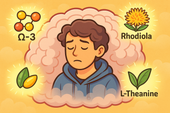
Brain Fog and Body Dysmorphic Disorder: Can Nootropic Supplements Help?
Brain fog often accompanies Body Dysmorphic Disorder, clouding focus and deepening emotional fatigue. Nootropic supplements like L-theanine, Rhodiola, and CoQ10 can help restore mental clarity, balance neurotransmitters, and bring calm energy back to the mind 🌿🧠.
-

How Stress Hormones Like Cortisol May Worsen Body Dysmorphic Disorder
Chronic stress floods the brain with cortisol — the hormone that keeps you on high alert. In Body Dysmorphic Disorder, this chemical overdrive fuels anxiety, distorts self-image, and traps the body in survival mode. Calming cortisol helps restore both peace and perspective 🌿🧠.
-

The Role of Neurotransmitters in BDD—and How Supplements May Help
Neurotransmitters like serotonin, dopamine, glutamate, and GABA shape how people with Body Dysmorphic Disorder perceive themselves. When these brain messengers fall out of balance, perception distorts — but targeted supplements can help restore calm, focus, and emotional regulation 🧠🌿.
-

What Is Body Dysmorphic Disorder? A Deeper Look at the Mind-Body Connection
Body Dysmorphic Disorder (BDD) isn’t just about appearance — it’s about perception. When brain chemistry, trauma, and stress distort self-image, the mind begins to see flaws that aren’t truly there. Healing starts by calming the nervous system and reconnecting mind and body 🪞🧠.
-

Keeping Calm in Competitive Sports: How to Train Your Mind, Body, and Chemistry for Peak Performance
Competitive pressure can overwhelm even the strongest athletes — but calm is trainable. By combining supplements like magnesium, L-theanine, and adaptogens with breathwork and mindset training, you can stay focused, balanced, and in control under any level of stress 🧠🏅.
-

Supplements for Parents Facing Toddler Tantrums: Staying Calm When Little Emotions Run Wild
Toddler tantrums can drain even the most loving parent — but your calm is powerful. With the right supplements like magnesium, L-theanine, and ashwagandha supporting your nervous system, you can stay patient, grounded, and kind, even when emotions run high 🧸🌿.
-

Workplace Stress and Anger Management Support
Workplace stress can quickly turn into frustration — but calm is a skill you can train. By combining supplements like magnesium, L-theanine, and adaptogens with breathwork and mindset tools, you can stay focused, patient, and emotionally grounded no matter how intense the office gets 💼🌿.
-

How to Stay Patient With Family During Stressful Holidays
Holiday gatherings can stir up old stress and test your patience — but calm is possible. With nervous system support from magnesium, L-theanine, and adaptogens, plus mindful breathing and clear boundaries, you can stay centered, kind, and grounded even when family chaos unfolds 🎄💞.
-

Supplements to Keep Calm During Traffic Jams
Getting stuck in traffic doesn’t have to ruin your mood. With calming supplements like magnesium, L-theanine, and ashwagandha, you can train your body to stay relaxed and focused behind the wheel — turning gridlock into a moment of grounded patience 🚗🌿.
-

The Role of Antioxidants in Healing Brain Stress from Dissociation
Antioxidants protect the brain from the oxidative stress caused by trauma and dissociation. By neutralizing free radicals and supporting mitochondrial recovery, they help restore clarity, focus, and emotional balance — allowing the mind to heal at the cellular level 🌿🧠.
-
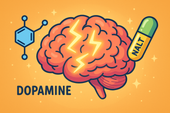
N-Acetyl L-Tyrosine (NALT) for Supporting Mental Clarity
N-Acetyl L-Tyrosine (NALT) fuels dopamine production — the neurotransmitter of focus and motivation. By supporting brain chemistry during stress, NALT helps restore mental clarity, energy, and alertness, making it easier to think clearly and feel present again ⚡🧠.
-

How Ginseng May Improve Focus and Energy in Dissociation
Ginseng helps combat the mental fatigue and fog that often come with dissociation. By supporting mitochondrial energy, balancing neurotransmitters, and regulating cortisol, it gently restores focus, motivation, and emotional presence — helping the mind reconnect with clarity and strength 🌿⚡.
-
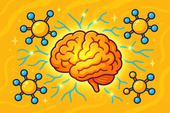
Phosphatidylserine and Dissociation: Supporting Cognitive Function
Phosphatidylserine helps calm the stress response by balancing cortisol, the body’s primary stress hormone. By lowering cortisol spikes, it protects memory, focus, and emotional stability — restoring clarity and mental presence for those struggling with dissociation 🧠🌿.
-
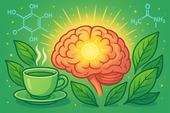
Can Green Tea Extract Help with Dissociative Brain Fog?
Green tea extract may help lift dissociative brain fog by supporting neurotransmitter balance, reducing inflammation, and enhancing energy at the cellular level. With its key compounds EGCG and L-theanine, it promotes calm focus, clarity, and emotional presence — helping you feel more alert and grounded 🍵🧠.
-

Building a Natural Supplement Stack for Dissociation Support
Building a supplement stack for dissociation means nourishing the brain and body back into communication. By supporting neurotransmitters, gut health, and energy balance through nutrients like magnesium, omega-3s, curcumin, and probiotics, you can help restore clarity, calm, and connection — one layer at a time 🌿🧠.
-

Chamomile and Lavender for Dissociative Anxiety Relief
Chamomile and lavender work together to calm dissociative anxiety by soothing the nervous system and restoring emotional safety. Their natural compounds balance cortisol, enhance GABA activity, and activate the vagus nerve — helping you feel grounded, connected, and at peace again 🌿💜.
-
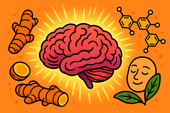
Curcumin for Inflammation and Mental Clarity in Dissociation
Curcumin, the golden compound in turmeric, does more than fight inflammation — it helps clear the mental fog often tied to dissociation. By calming neuroinflammation, balancing neurotransmitters, and supporting mitochondrial energy, curcumin can restore mental clarity, focus, and emotional presence 🌿🧠.
-
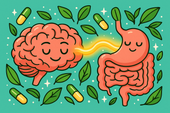
Probiotics and Dissociation: Exploring the Gut–Brain Axis
The gut–brain axis plays a vital role in emotional awareness and presence. When the microbiome is balanced, it supports serotonin production, vagus nerve activity, and calm focus. Probiotics help repair this connection — restoring safety, clarity, and the feeling of truly being in your body again 🌿🧠.
-
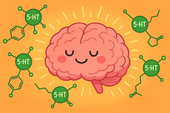
5-HTP for Dissociation: Supporting Serotonin and Emotional Stability
5-HTP helps bridge the gap between emotional numbness and stability by supporting serotonin production — the neurotransmitter that shapes mood, sleep, and sensory awareness. For people experiencing dissociation, 5-HTP may gently restore connection, presence, and emotional balance from the inside out 🌿🧠.
-
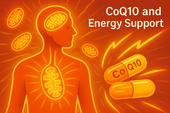
CoQ10 and Energy Support for People with Dissociation
Chronic dissociation often leaves the body running on empty — tired, foggy, and disconnected. CoQ10 helps recharge that system at the cellular level by restoring mitochondrial energy, reducing oxidative stress, and supporting the brain’s capacity to stay present. It’s energy medicine for both body and mind ⚡🧠.


















































